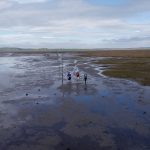Description
Pilgrim’s Causeway
This is walk is a firm favourite of many of our walkers. Before starting out on the Pilgrim’s Causeway, we will visit The Barn at Beal, so feel free to come early to enjoy a tea or coffee before we set off.
| Hills: | No hills | |
| Distance: | Medium distance | |
| Grade: | Moderate (distance) | |
| Map: |  |
|
| This walk is on map Explorer 340 – Holy Island and Bamburgh. Click on map image to buy this map. | ||
| Declaration: We are a participant in the Amazon Services LLC Associates Program, an affiliate advertising program designed to provide a means for us to earn fees by linking to Amazon.com and affiliated sites. | ||
The start
When the tide is right we will set off down the track to the start of the causeway. We will follow the road to a convenient spot where we can take off our shoes or put on wellies (it can be quite wet) ready for the Pilgrim’s Way experience.

Walking the Pilgrim’s Causeway
Walking close to the guide poles, we will cross the sands to the island. If we are lucky, we will see, and maybe even hear, the seals in the distance.

Once on the island we have a short time to explore and have lunch, before returning along the same route.

Note: You must be ready to leave the island when instructed, for obvious safety reasons.
Places along the way
The Barn at Beal
The Barn at Beal was an old disused cart shed/barn. In 2008 it was converted into the facility that it is now. Now, as well as being a coffee shop/restaurant, The Barn at Beal has areas for camping, and a bothy. There is also the Bothy Bar, for those staying over.
Pilgrim’s Causeway
The Pilgrim’s Causeway has been in use since the year 635, when the monastery was established. This was the only way to reach before the current road causeway was built in 1954.
Lindisfarne (Holy Island)
Lindisfarne is a small island with a lot of history. St Cuthbert, St Aidan, Lindisfarne Castle and Lidisfarne Priory.
St Cuthbert lived here for 10 years before moving to Inner Farne to follow a calling he had to become a hermit. At the age of 50 he reluctantly became a Bishop and travelled the region before returning to Inner Farne, where he died. His body was brought back to Lindisfarne to be buried. However, this was not his final resting place.
King Oswald (later St Oswald) summoned St Aidan to become bishop of his kingdom. St Aidan formed a monastery on Lindisfarne of which the priory was part.
Lindisfarne Castle is a 16th century castle. After centuries in defence of Lindisfarne, it was converted to a home in 1901 by Sir Edwin Lutyens. A walled garden was created soon after by Gertrude Jekyll.
More recently, Lindisfarne has become the end of St Cuthbert’s way, the long distance path that starts at Melrose in Scotland.
The island is cut off from the mainland twice a day, when the tide comes in. Please check the tide times before crossing, or you might get stuck there for several hours.










